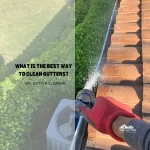Gutter sludge, a common issue in home maintenance, is a dense, viscous material found in rain gutters. This substance is primarily composed of decomposed organic matter such as leaves and twigs, mixed with dirt and granules from roof shingles. Its formation is a gradual process, often exacerbated by infrequent cleaning and certain weather conditions. When leaves and other debris settle in the gutters, over time, they decompose, combining with rainwater to form this sludgy material.
The significance of understanding gutter sludge lies in its potential impact on a home’s health.
If left unattended, it can lead to gutter blockages, resulting in improper water drainage.
This can cause water to overflow and potentially damage the home’s foundation, exterior walls, and landscaping.
Additionally, clogged gutters with sludge are ideal breeding grounds for pests and can contribute to roof damage.
Regular gutter maintenance, such as cleaning and using gutter guards, is essential to prevent the formation and accumulation of gutter sludge, thereby safeguarding the home against various water-related issues and maintaining its aesthetic appeal.
This introduction to gutter sludge aims to provide homeowners with essential knowledge on its composition, formation, impact, and prevention, laying the groundwork for deeper understanding and effective management.
Understanding Gutter Sludge
Gutter sludge, a key concern in home maintenance, is a viscous, dense material commonly found in residential rain gutters. This section delves into the composition, formation, and impact of gutter sludge, providing homeowners with essential information for effective gutter management.
Composition and Characteristics
Gutter sludge primarily comprises decomposed organic matter, such as leaves, twigs, and moss, mixed with mud, shingle granules, and stagnant water. Its consistency varies from a thick, muddy substance to a more fluid, slush-like state, depending on the amount of water it contains. The color typically ranges from dark brown to black, and it often emits an unpleasant odor due to the decaying organic matter.
How Gutter Sludge Forms in Your Home’s Gutters
The formation of gutter sludge is a gradual process, resulting from the natural accumulation of debris in gutters. Leaves, twigs, and other organic materials carried by the wind settle in gutters. Over time, these materials decompose, especially in the presence of moisture from rainfall or condensation, forming a sludge-like substance. Infrequent gutter cleaning exacerbates this accumulation, leading to more significant sludge buildup.
The Impact of Gutter Sludge on Home Maintenance
Understanding the impact of gutter sludge is crucial for maintaining the integrity and functionality of a home’s gutter system. This segment addresses the potential damages and pest infestation risks associated with gutter sludge.
Potential Damages Caused by Gutter Sludge
Gutter sludge can lead to severe issues if not addressed promptly. The clogging of gutters impedes proper water flow, causing water to overflow, which may result in water damage to the home’s foundation, siding, and landscaping. Additionally, the extra weight of the sludge can strain and damage the gutter system itself, leading to costly repairs or replacements.
Gutter Sludge and Pest Infestation Risks
The moist, organic nature of gutter sludge creates a conducive environment for pests such as mosquitoes, ants, and rodents. These pests are attracted to the damp, decomposed material for breeding and nesting, potentially leading to infestations that can extend to other parts of the home. Regular gutter cleaning and maintenance are essential to prevent these risks and keep the gutter system functioning optimally.
Prevention Strategies for Gutter Sludge
Preventing gutter sludge is key to maintaining a healthy gutter system and avoiding the issues it can cause. Effective prevention strategies involve regular maintenance and the installation of protective devices.
Importance of Regular Gutter Cleaning
Regular gutter cleaning is the most effective way to prevent the accumulation of gutter sludge. Homeowners should clean their gutters at least twice a year, typically in the spring and fall, to remove leaves, twigs, and other debris that can decompose into sludge. This regular maintenance not only prevents blockages but also prolongs the lifespan of the gutter system and protects the home’s foundation and exterior from water damage.
Advantages of Gutter Guards and Screens
Installing gutter guards or screens is a proactive measure to reduce the amount of debris that enters the gutters. These devices allow water to flow into the gutters while keeping out larger debris like leaves and twigs. This significantly reduces the likelihood of sludge formation and decreases the frequency of gutter cleanings needed. Gutter guards and screens come in various materials and designs, offering options to fit different gutter types and homeowner preferences.
Effective Methods for Removing Gutter Sludge
Once gutter sludge forms, it’s important to remove it promptly to ensure the gutters function correctly. There are several effective methods for removing gutter sludge, ranging from DIY techniques to professional services.
DIY Techniques for Gutter Sludge Removal
For those comfortable with ladder work, DIY gutter cleaning can be a cost-effective solution. Using gloves, a garden trowel or gutter scoop, and a bucket, homeowners can manually remove sludge from their gutters. After scooping out the sludge, flushing the gutters with a garden hose can help clear any remaining debris and check for proper water flow. Safety should always be a priority, and proper precautions such as using a sturdy ladder and having a spotter are essential.
When to Hire Professional Gutter Cleaning Services
In some cases, hiring professional gutter cleaning services may be the best option. This is particularly true for multi-story homes, complex roof designs, or when the sludge buildup is severe. Professional cleaners have the necessary tools, expertise, and safety equipment to efficiently and effectively clean gutters. Additionally, they can often identify and address gutter-related issues that might not be apparent to the homeowner, such as minor repairs or adjustments needed for optimal gutter performance.
Long Term Gutter Maintenance Tips
Long-term gutter maintenance is essential for the health and functionality of your home’s gutter system. By following these tips, homeowners can ensure their gutters remain effective and durable.
Seasonal Gutter Maintenance Schedule
Seasonal maintenance is crucial for gutter care. In spring, inspect and clean gutters to clear winter debris. Summer is ideal for repairs and checking for leaks. Autumn requires thorough cleaning after leaves fall. Finally, in winter, ensure gutters are clear of ice and snow buildup. This seasonal approach prevents major issues and maintains gutter efficiency.
Products and Tools for Gutter Care
Essential tools for gutter maintenance include sturdy ladders, gutter scoops, gloves, and hoses. Consider investing in a gutter cleaning robot, extendable gutter cleaning wands, and downspout guards. For protection, gutter mesh guards or leaf filters are useful. These tools make gutter cleaning safer and more effective.
Understanding the Risks of Neglected Gutters
Neglecting gutter maintenance can lead to significant, costly problems for homeowners. Understanding these risks emphasizes the importance of regular gutter care.
Water Damage and Structural Issues
Clogged or damaged gutters can lead to water overflow, causing damage to the home’s foundation, walls, and landscaping. Water infiltration can also cause mold and mildew, threatening the home’s structural integrity and indoor air quality.
The Hidden Costs of Gutter Neglect
Neglected gutters can lead to unexpected expenses like roof damage, foundation repairs, and pest control. Consistent maintenance mitigates these costs and extends the life of your gutter system.
FAQs on Gutter Sludge and Gutter Maintenance
This section answers common questions about gutter sludge and maintenance, providing homeowners with valuable insights for effective gutter care.
Commonly Asked Questions About Gutter Care
Common questions include the frequency of gutter cleaning, the best time for maintenance, signs of gutter issues, and the effectiveness of gutter guards. These answers help homeowners make informed decisions about their gutter care routine.
Expert Answers to Your Gutter Maintenance Queries
This part provides expert insights into more specific queries, such as dealing with challenging gutter clogs, the benefits of professional gutter cleaning services, and tips for preventing gutter sludge formation. The expert advice ensures homeowners are well-equipped to maintain their gutters effectively.


